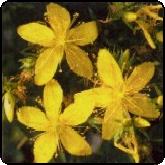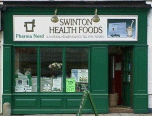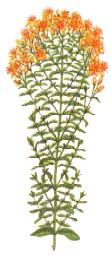St. John's Wort

(Hypericum Perforatum)
(INDEX)
A brief introduction...
There is so much clear evidence that St. John's Wort is more beneficial than the numerous manufactured drugs; this is mainly due to St. John's Wort having significantly fewer known side effects.
There seems to be a misunderstanding about adverse effects from taking St. John's Wort - in reality, you should take advice before using SJW if you are already taking other medication, just as you would with any medication, for whatever purpose.
My own experience suggests that Paroxetine (also branded as Seroxat and Paxil) has side effects which can, for some people (including me), be enough to worsen the depression it is intended to be relieving.
Paroxetine actually increased suicidal feelings, caused panic attacks, and virtually destroyed my social life. There are some people who no longer associate with me, because I have caused them considerable embarrassment, or hurt them with behaviour over which I had no control.
St. John's Wort has brought that behaviour back under control to a large extent - it has restored my will to fight against such apparently thoughtless actions.
I cannot comment on other antidepressants; I know as many people who recommend Prozac as those who do not; it would appear that the whole thing is somewhat 'trial and error'.
St. John's Wort and other herbal products may be purchased from:
Swinton Health Foods
Moorside Road
SWINTON
 CLiCK!
CLiCK! 
I can recommend them both for the quality of products they stock and for the standard of good advice given.
They would not sell St. John's Wort to me without first making sure of the reason why I wanted it, and checking to see what medications (if any) I was already taking. Only when he was satisfied that it was safe, and I was sure of what I was doing, did Bernard allow me to purchase some St. John's Wort extract.
He also advised me that, as a first time user, the liquid extract (tincture) was the best form of St. John's Wort to try, and if I was not experiencing an improvement after one month, I should stop taking it.
The following texts are from various sources.
To begin with, a very old book (thanks, Helen!).
Nicholas Culpeper's 'The Complete Herbal' published in 1649.
Edited by David Potterton and published in 1983 by W. Foulsham & Co. Ltd.
Renamed 'Culpeper's Colour Herbal' (ISBN 0-572-01152-0)
Culpeper's Colour Herbal contains the following entry about St. John's Wort:

St. John's Wort
(Hypericum Perforatum)
A tincture of the flowers in spirit of wine is commended against the melancholy and madness
A perennial plant growing to about two feet (61cm) high, with yellow flowers which yield a reddish juice like blood when bruised. Also called Perforate St. John's Wort.
Where to find it: Shady woods and copses, meadows and by roadsides.
Flowering time: Midsummer.
Astrology: It is under the celestial sign of Leo, and the dominion of the Sun.
Medicinal virtues: Aperient, detersive and diuretic. It is helpful against tertian and quartan agues, is alixpharmic, and destroys worms. It is an excellent vulnerary plant. Outwardly, it is of great service in bruises, contusions and wounds, especially in the nervous parts, if it be boiled in wine.
Made into an ointment, it dissolves swellings and closes up the lips of wounds. The decoction of the herb and flowers, but especially of the seeds, drunk in wine, with the juice of Knotgrass, helps all manner of vomiting and spitting of blood. It is also good for those who cannot make water, and are bitten or stung by venomous creatures. Two drams (3.5g) of the seed made into powder and drank in broth, expels choler or congealed blood in the stomach. The seed taken in wine is recommended for sciatica, falling sickness, and the palsy.
Modern Uses: St. John's Wort has an affinity for nerve endings and is used in all cases where there is nerve irritation, whether it be a tickly cough, referred pain, or neuralgia. It is expectorant, diuretic and sedative. In dry, irritating coughs, it is combined with Colt's Foot and Marsh Mallow. It is usually added to all prescriptions where the condition is painful. For wounds and boils, the ointment, made by digesting the herb in white wax and straining, can be combined with ointment of Marsh Mallow. For skin diseases where there is inflammation, it is combined with Chickweed ointment. The infused oil made from the flowers is recommended as an application for external ulcers and wounds. Preparations are available from herbalists.
St John's Wort - information and analysis
New research suggests that SJW inhibits the reuptake of the neurotransmitters serotonin, norepinephrine and dopamine. This action is probably due to the constituent hyperforin. By making more of these neurotransmitters available to the brain, SJW is able to act as an antidepressant.
St. Johns Wort, "Hypericum Perforatum"
Blooming in Midsummer, the bright golden blossoms of St. Johns wort can be found on the edges of hayfields or in unmown pastures. They can be identified by the translucent dots in the leaves, and the dark dots on the edges of the five petals.
Until recently, the standard course of treatment for depression included cognitive therapy and drugs, which can have serious side effects.
St. Johns wort (wort means plant), also known as hypericum perforatum, has been used for thousands of years to relieve symptoms of depression, and the ongoing modern research looks very promising.
St. Johns Wort effectiveness in combating depression is quickly being recognised as a safe and effective treatment for depression.
In Germany, where there has been extensive research on St. Johns Wort, products containing this herb accounts for over 50% (*) of the German antidepressant market, while Prozac accounts for only 2%.
(* Joseph Glenmullen MD in his book, Prozac Backlash, suggests 80%).
Toxicity
There are approximately 1,000 deaths per year attributed to aspirin use. Safer than Aspirin - In the 2,400 years of recorded use of St. Johns Wort, not one death has been attributed to its use.
Phototoxins
With some antidepressants, there can be phototoxic reactions. Even in high doses, given intravenously to AIDS patients, phototoxic effects have been rare and never deadly with St Johns Wort.
Decreased Sexual Desire or Function
This is common with many prescription antidepressants. St Johns Wort appears to have little or no effect sexually.
Dry Mouth
Tiredness
Restlessness
Negative interactions with other drugs and Alcohol
Headaches
These are common side effects with some prescription medications for depression, yet St Johns Wort rarely has side effects.
Many people on prescription medications for depression abandon use of the drugs because of the bad side effects, users of St Johns Wort very rarely have adverse reactions and so continue the treatment enjoying the benefits fully.
Overall, the common side effects of antidepressants were reported in 35.9% of the patients, as opposed to 10.8% of those taking St. Johns Wort.
The British Medical Journal reported, "The side effects of hypericum were rare and mild.
For more detailed information:
Hypericum (St. John's Wort) & Depression
by Harold Bloomfield M.D., Mikael Nordfors M.D., and Peter Williams.
St Johns Wort Analytical Data
Active Components
Hypericin:
Treatment of depression
Increases capillary flow
Other active compounds
Pseudohypericin:
antiretroviral activity
Tannins:
for astringent effect
Flavonoids
Xanthones
phenolic carboxylic acids
essential oils
carotenoids
medium chain fatty acids
Pharmacology:
Antidepressant Activity
Mechanism of Action?
Antiviral Activity (in vitro)
Herpes simplex virus types 1 and 2
Influenza types A and B
Vesicular stomatitis virus
Epstein-Barr virus
HIV?
Antibacterial Activity
(broad spectrum against both gram + and gram -)
Staphylococcus aureus
Streptococcus mutans
Proteus vulgaris
Escherichia coli
Pseudomonas aeruginosa
Clinical Applications
Depression:
Standardized extract containing 0.14% hypericin.
Has been used pharmacologically in Germany for years.
Doses of 300 mg TID are as effective in relieving symptoms of depression as standard antidepressants, but is much better tolerated with fewer side effects.
AIDS & Other Viral Infections:
SJW may be a useful adjunctive treatment for herpes simplex, mononucleosis, and influenza.
Further human studies are needed to determine the optimal dosage.
May be a promising treatment for chronic fatigue syndrome.
Numerous studies:
18 HIV patients received 2 mg hypericin/day
Showed stable and increasing T-cell counts over the 40 months follow-up
Most noteworthy: only 2 of the 18 encountered an opportunistic infection during the 40 month follow-up
Trials so far have been disappointing
Significant blood levels of hypericin could not be achieved using either oral or IV extracts
Studies are now using a synthetic hypericin which is showing encouraging results in preliminary studies
Topical Applications:
Long been used as a wound-healing substance
Antibacterial activity:
Have been used to treat burns and muscular pain
Oily preparations preferred
The following article appeared in the Daily Mail on September 1st., 2000
Nature's Prozac - Hailed by Doctors
European market worth £3.75 billion a year.
A popular herbal remedy known as 'Nature's Prozac' can help combat depression as effectively as prescribed drugs, say doctors.
Because of the success of St. John's Wort as an anti-depressant, it should be considered as a first treatment in mild to moderate cases of the illness, they advise.
The largest-ever study of the herbal pill - derived from dried flowers of the yellow hedgerow plant - found it was 'therapeutically equivalent' to Imipramine, marketed as 'Tofranil', one of the most commonly-used drugs for depression, and St. John's Wort stole a march on the prescription drugs when it came to side effects, with fewer patients reporting symptoms such as dry mouth, sweating and dizziness.
The latest report by researchers in Germany, published by the British Medical Journal today, found the plant extract was also more effective because patients were more likely to keep taking it.
In the study by Giessen University, more than 300 patients in 40 outpatient clinics being treated for mild to moderate depression were randomly given either the herbal remedy or Imipramine for six weeks.
Medical director Helmut Woelk concluded that both treatments were equally effective at alleviating depression. However, only 39 percent of St. John's Wort patients experienced side effects, compared with 63 percent taking Imipramine.
'These results, along with other trials, provide compelling evidence that St. John's Wort extract is as effective as standard anti-depressants,' said Mr. Woelk. 'In view of its superior safety record, it should be considered for first line treatment in mild to moderate depression.'
The research is a boost to the herbal pill, at the centre of health fears over its potential to cause cataracts when users venture into strong sunlight.
Earlier this year women taking the contraceptive pill and prescribed medicines for HIV, depression and migraine were advised not to use St. John's Wort because it could prevent their drugs from working properly. An estimated two million people in Britain regularly use St. John's Wort, with the European market worth an estimated £3.75 billion a year. The remedy is said to be attracting new users at the rate of 2000 percent a year.
The Depression Alliance welcomed the research, but said GPs should be consulted before taking St. John's Wort because 'although it is natural it has a medicinal effect'.
A spokesman added: 'However, it could be useful for those suffering depression for the first time because they are often concerned about using prescription drugs.'
Daily Mail - Friday September 1st. 2000
(Beezy Marsh - Medical Reporter)
INDEX
Top of Page
Introduction
Swinton Health Foods
Culpeper's Herbal
Information section
Analysis section
Recent newspaper article
Plant Picture
Flowers Picture
Home Page
Click here to email me...
© 2000 Bernard Cromarty

 CLiCK!
CLiCK! 
